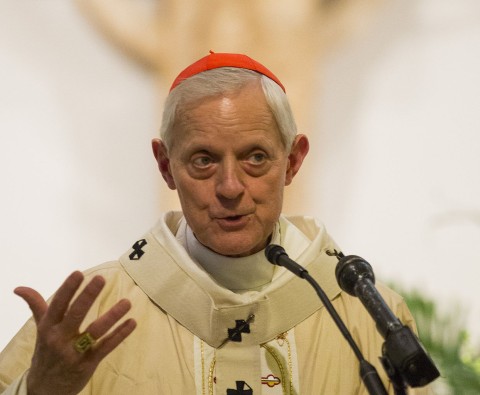Pope accepts Washington cardinal Donald Wuerl’s resignation
Wuerl is one of the most prominent leaders affected in the clergy sexual abuse crisis roiling the Catholic Church.

Pope Francis accepted the resignation of Washington, D.C., cardinal Donald Wuerl after he became entangled in two major scandals involving cover-up of sexual abuse and lost the support of many in his flock.
But in a letter released by Wuerl’s office, Francis praised his longtime ally and suggested Wuerl had unfairly become a scapegoat, having made some “mistakes” in handling sexual abuse cases, but not having covered them up.
Wuerl is one of the most prominent leaders affected in the scandal roiling the Catholic Church. His predecessor as Washington archbishop, Theodore McCarrick, was recently forced to resign as cardinal over accounts that he sexually abused at least two minors.
In early October Pope Francis authorized a “thorough study” of Vatican archives to identify how McCarrick advanced through church ranks despite allegations that he slept with seminarians and young priests. The Vatican statement did not address charges made by Carlo Maria Viganò, a retired Vatican ambassador, that in 2013 Francis rehabilitated McCarrick from sanctions imposed by Pope Benedict XVI.
Read our latest issue or browse back issues.
“Both abuse and its cover-up can no longer be tolerated and a different treatment for bishops who have committed or covered up abuse in fact represents a form of clericalism that is no longer acceptable,” the statement said.
In a separate statement October 12, the Vatican said Francis had accepted Wuerl’s resignation but named no replacement; in his letter, the pope asked Wuerl to stay on in a temporary capacity until a new archbishop is found.
The decision came after months in which Wuerl, who turns 78 in November, initially downplayed the scandal and insisted on his own good record. He progressively came to the conclusion that he could no longer lead the archdiocese.
“The Holy Father’s decision to provide new leadership to the archdiocese can allow all of the faithful, clergy, religious and lay, to focus on healing and the future,” Wuerl said in a statement October 12. “Once again for any past errors in judgment I apologize and ask for pardon.”
In recent months, several priests in the archdiocese encouraged Wuerl to resign, and a prominent deacon at the Cathedral of St. Matthew the Apostle in Washington, James Garcia, announced that he would not assist Wuerl in any rituals.
“It is easy to say that the work of the church is undertaken by fallen, sinful humans—that the Lord works through mere earthen vessels,” Garcia wrote. “But when an earthen vessel is cracked, it cannot reliably hold anything. It fails in its most basic function. The shepherds of the church—compromised by both witting cooperation and unwitting poor judgment—have failed in their most basic function: safeguarding the faithful.”
Wuerl had submitted his resignation to Francis nearly three years ago, when he turned 75, the normal retirement age for bishops. But Francis kept him on, as popes tend to do with able-bodied bishops who share their pastoral priorities.
But a grand jury report issued in August on abuse in six Pennsylvania dioceses accused Wuerl of helping to protect some priests who had abused children while he was bishop of Pittsburgh from 1988 to 2006. Simultaneously, Wuerl faced widespread skepticism over his insistence that he knew nothing about years of alleged sexual misconduct by McCarrick.
In one case cited in the report, Wuerl—acting on a doctor’s recommendation—enabled priest William O’Malley to return to active ministry as a canonical consultant in 1998 despite allegations of abuse lodged against him in the past and his own admission that he was sexually interested in adolescents. Years later, according to the report, six more people alleged that they were sexually assaulted by O’Malley, in some cases after he had been reinstated.
Wuerl apologized for the damage inflicted on the victims but also defended his efforts to combat clergy sexual abuse.
His defenders have cited a case that surfaced in 1988, when a 19-year-old former seminarian, Tim Bendig, filed a lawsuit accusing a priest, Anthony Cipolla, of molesting him. Wuerl initially questioned Bendig’s account but later accepted it and moved to oust Cipolla from the priesthood. The Vatican’s highest court ordered Wuerl to restore Cipolla to priestly ministry, but Wuerl resisted and, after two years of legal procedures, prevailed in preventing Cipolla’s return.
“No bishop or cardinal in the nation has had a more consistent and courageous record than Donald Wuerl in addressing priestly sexual abuse,” said Bill Donohue, president of the Catholic League.
David Clohessy of the Survivors Network of those Abused by Priests said Wuerl’s “long-overdue” resignation would likely do little to deter others in the hierarchy from covering up for abusers.
“But if archaic, predatory-friendly laws were reformed and if more prosecutors showed real courage, these complicit clerics might face criminal charges, and that might make a real difference,” he said in a statement. —Associated Press; added information
A version of this article appears in the print edition under the title “Pope accepts Washington cardinal Donald Wuerl’s resignation amid clergy sexual abuse crisis.”





